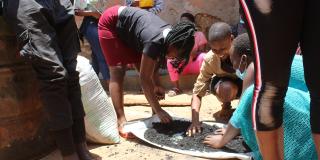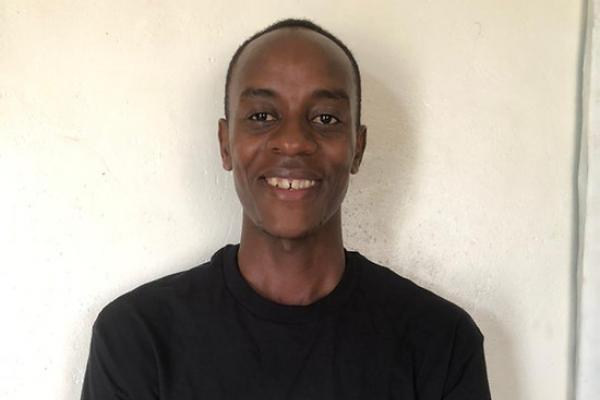
Meet Hosea Tumwine – an extraordinary young person and enthusiastic champion of women and girls’ rights in Uganda. Hosea is a member of VSO’s global youth network.
VSO’s Global Youth Network
VSO works with over 5,000 young people globally, and has youth networks established by, and led by youth in 17 countries in Asia, Africa, and Europe. Members include International Citizen Service (ICS) returned volunteers, national youth volunteers, community volunteers and marginalised young people that VSO works with through its programmes. The networks work closely with VSO programming teams to design and lead on key projects for VSO. Young people are a catalyst for change - they have the passion and creativity to bring about innovative solutions to global emergencies such as climate change as this could determine their future.
Please note the following blog includes distressing themes.

Meet Hosea
“I am 27 years old, and I live in Mbarara District, Western Uganda. I joined VSO as a volunteer under the International Citizen Service (ICS) program in 2018. As an ICS alumnus, I was invited to join VSO’s global youth network as a regional representative in the western region of Uganda. I was then selected to be a youth champion for my region is June 2021.
As a youth champion, I carried out research on what meaningful employment means to young people as part of the Challenge Fund for Youth Employment (CFYE), a programme run by VSO and other partners which supports youth employment initiatives. Currently, I am working as a national volunteer on the CFYE programme where my role is to enhance youth voices through research and advocacy.”
Hear from Hosea at the Commonwealth Heads of Government Meeting, June 2022
Why are you passionate about climate action?
“Like many local women, my mother depends on a good harvest to generate an income and support their children. A bad harvest can have a disastrous affect on the future of girls.
If our mothers and fathers can’t harvest, due to floods and droughts, then they have no income to afford to pay for their children’s school fees. Education stops for young girls who are then forced to marry early, in their teenage years and bear many children, who then aren’t afforded an education, and so the cycle of poverty continues.
Many women and girls in western Uganda still rely on firewood to cook. There is no electricity, and they cannot afford charcoal. The demand for firewood has led to deforestation, forcing women and girls to walk further and further away to look for firewood, increasing their chances of being assaulted. I know of one girl who was raped in the forest”.
What climate innovations did you come up with?
VSO awarded VSO Uganda £2,500 under its Youth-led Climate Innovation Grant with the objective of raising awareness amongst women and youth of clean energy alternatives to charcoal and firewood in the slum areas of Uganda.
The UK government funded grant was awarded to ten countries in which VSO works, across Asia and Africa. The grant supports youth-led innovation in climate resilient agriculture, waste management and clean energy, flooding and awareness raising though digital platforms and art.
“I worked with other youth from my community to develop Briquettes, a smart, clean, durable, and cheap energy for cooking. VSO’s national youth network was able to identify 80 trainers spread across the four regions of Uganda. These individuals were able to train youth and women in their local communities on waste recycling. Through awareness raising and workshops, we were able to train 200 trainees (women and youth) to reach community members in the western region of Uganda.
I found that the key is to work with local female leaders to mobilise other women and youth from their own communities.”
“The conversations held during these training sessions were critical in increasing awareness in the community as many women and youth weren’t educated about climate change. Young people from each community were able to translate the workshops into local and regional languages.
We invited members of the community, including the police, local council leaders, environmental protection officers, youth leaders and women and girls to vote on whether the government was addressing key issues facing the community, such as the impact of climate change on smallholder agriculture food producers, particularly women.
Depending on the outcome of the vote, follow up actions were developed for each region. By this method duty bearers are held accountable to the promises made to the people that voted for them. Our focus now is on expanding briquette making with the resources available.”
What’s been your proudest moment
“My proudest moment is that people in my own village heard about climate change for the first time. We also have a place where women can gather and produce briquettes. Now we are focusing on having more machines and equipment, so we can make a sustainable business.”
What do you hope to achieve in the future?
“I want to set up a climate innovation space in the community where we can gather, share learnings, produce more materials, and have an even greater impact.”
Why are youth key to combatting climate change?
"The briquette making is a youth-led innovation. I believe youth have the energy, the creativity, and the time. We just need the support and trust from our peers and decision makers. Across the youth network in Uganda, there are 36 languages spoken, which helped us to be effective in communicating with different communities on climate change. Young people are best placed to hold decision makers to account. Young people are the majority, and our future is at risk if we do nothing.”
Read more

A ripple of change: how VSO volunteers are transforming communities
Every act of volunteering begins with a choice — a decision to act out of a desire to make a difference. Across the world, VSO volunteers are proving that one spark of action can ignite something much bigger.

The two volunteers empowering girls and young women in Mozambique
Nelma and Carmirene and are two volunteers working on VSO's EAGLE project in Mozambique. For Nelma and Carmirene, education is not just about school, it is about meeting people where they are and using the right tools to challenging harmful norms. Here are their stories.
Opening doors to safety, education, and a brighter future
For girls in Karamoja, the poorest region in Uganda, being forced into early motherhood is all too common. This Christmas, you can open the doors to Safety, Education, and a Brighter Future.
